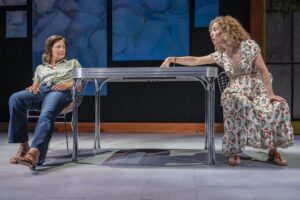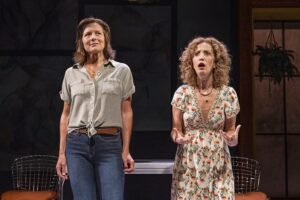So many friendships are born of circumstance — two people become roommates, neighbors, parents at the same time, or co-workers — and the experience can be intense for a time, perhaps life-altering, yet doesn’t always last. Do you go on together into whatever comes next, or does time, or distance, fray that bond?

In his 2023 play Summer, 1976, now in a beautifully rendered and frequently funny production at Wellfleet Harbor Actors Theater, David Auburn gives us such a relationship between two very different women. The play explores whether they can, in spite of taking different paths, stay close.
They strike up a friendship in Ohio during the titular summer when their young daughters are playing together. Diana (Jennifer Van Dyck) is an artist, teacher, and single mom with highbrow tastes and ideas. She sometimes disdains the views held by Alice (Annie Meisels), a free-spirited professor’s wife who hates housework and reads popular novels.
Auburn, who won the 2001 Pulitzer Prize for Proof, began writing the 90-minute memory play as monologues, and that origin is clear in the way the women in this two-hander often speak directly to the audience. As they tell and reflect on their stories, they confide their initial bad impressions of each other, which kicks off the appealing, conversational, and sometimes comedic tone of Daisy Walker’s tender and insightful direction.
The women are different, but both are lonely and restless until this friendship provides alliance. Van Dyck’s uptight Diana is opinionated, often judgmental, but when pushed is hardest on herself. Van Dyck gives Diana an unspoken vulnerability, making it clear the prickly exterior is armor for the lack of comfort she finds in herself. She says she’s an artist but hasn’t quite achieved that, no matter how she tries to present herself. This friendship becomes a hoped-for turning point that means more than she’s willing to admit.
Diana sees traits she envies in Alice and vice versa. Meisels’s Alice is open and unconventional, and her wild curls and flowy, flowered dress courtesy of costume designer Jennifer Spagone make a clear contrast to Diana’s plain-jeans-and-blouse personality. Yet Meisels gives Alice vulnerability, too, and an edge. She’s smart and competent but uncertain around privilege, and among academics she eye-rollingly wonders why people take themselves so seriously.
Auburn’s script includes few references to the title’s chosen time period, and designer Kevin Judge’s evocative main set of chrome kitchen table and chairs, frosted glass entryway, hanging plants, and abstract art only hint at where we are in time. Auburn likely wants us to consider the subtext of the era the play recalls: after Vietnam, after Nixon, nearly a decade after the Summer of Love — a time of post-counterculture letdown but from today’s perspective also quaintly devoid of smartphones, a time of sending cards rather than texts.
Particularly worth pondering in this election-year summer nearly 50 years later is that both women had become pregnant — Diana on her second date with an unimpressive college boyfriend, Alice early in her marriage to tenure-striving husband Doug — shortly before Roe v. Wade made abortion a choice nationwide in 1973.

Separately and together, Diana and Alice contemplate their lives as women in the mid-1970s, where their choices have gotten them, and what could still change. While the women lead quiet, almost mundane existences — one where Doug’s creation of a college-parent babysitting swap through “shares” is a key plot point — feminist thoughts and discussions bubble up in the background.
At one point, Alice laments, “I don’t know who I am.” And while Diana considers herself more of a “square,” she’s the one who sees the chance for reinvention when Alice wonders, “What am I supposed to do?” Both had education and career ambitions that haven’t worked out, in part because motherhood or marriage took precedence and perhaps, too, because of conformity to the expectations of the times.
The Bicentennial summer was also one that included a focus on independence, which Auburn has said in interviews meant hope and possibility as the country turned a page. As the women look ahead to what’s next, both make pivotal changes, though they’re not the most freeing choices one could imagine. And when Diana and Alice look back on it all, it’s clear that what they have each achieved couldn’t have been kickstarted without the other.
Auburn’s play — a Broadway vehicle last year for Laura Linney and Jessica Hecht — is a character study and era study more than anything. It focuses on small moments, occasionally meanderingly so. Its story is about white, privileged women — Diana has family money, Alice pinches pennies as a stay-at-home mom — so the play depicts a somewhat sheltered slice of mid-1970s white Americana. (Diana once sarcastically compares Alice to a 1950s housewife.)
That slice, though, offers a poignant and humorous look at both the intensity of young friendships and the strangeness of the 1970s. In this relatable and warm WHAT production, the actresses and Walker make these characters two women you’re glad to know.
Reflections on Independence
The event: Summer, 1976, by David Auburn
The time: Tuesdays through Saturdays through Aug. 31, 7 p.m.
The place: Wellfleet Harbor Actors Theater, 2357 Route 6
The cost: $45 (students $15) plus $3.75 fees, at what.org or 508-349-9428
